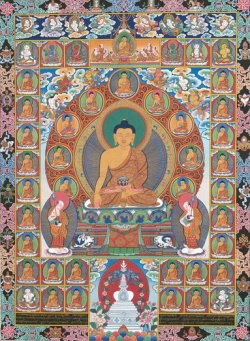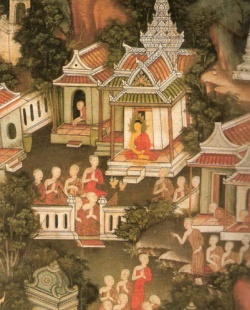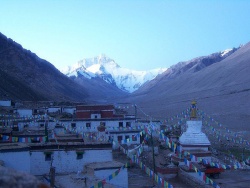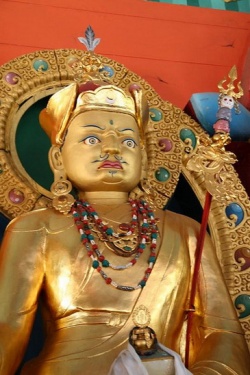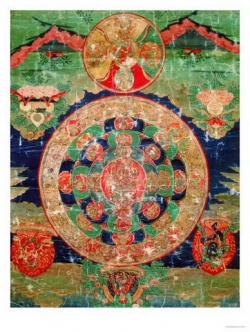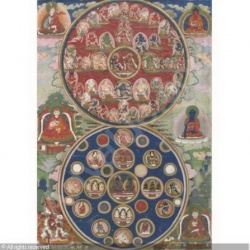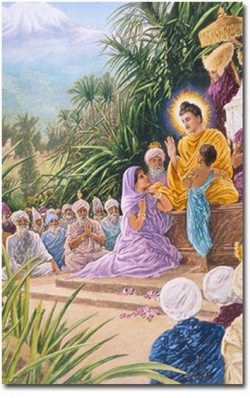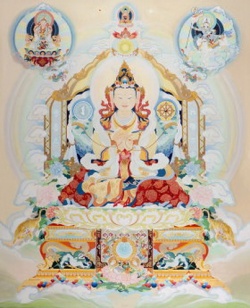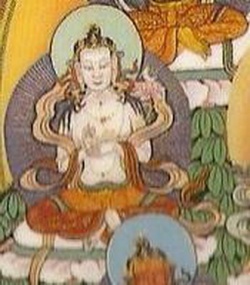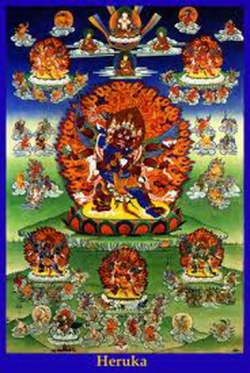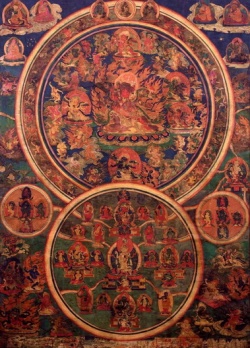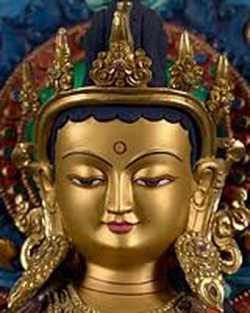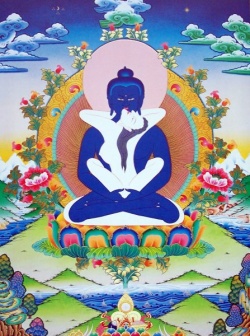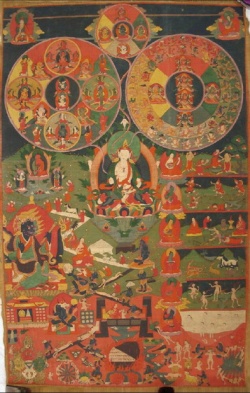Develop and Maintain a Relationship Between Teacher and Disciple
Nagarjuna, a great Bodhisattva, said:
“Just as the wise ones will respect a statue of the Sugata Even though it may be made of wood [and] however [unadorned] it may be, So in the same manner, although this composition of mine may be pitiful,
May you not criticize it, for it is based on the Sublime Teaching.” I am not saying this as my idea. This is from the Sutra and Tantra teachings of Shakyamuni Buddha. Most people haven’t read it, and that’s why I made this collection of teachings.
Generally speaking we must not misinterpret the teachings.
Because we have had bad habits for many lives, the truth is hard for us to
believe. That’s why it’s necessary to maintain a good relationship with our
teacher.
Shantideva (8th century) said:
“A beneficial word and they resent it
While all they do is turn me from the good.
And if to what they say I close my ears,
Their anger burns, the cause of lower states.”
Also, Samanthabadra’s manifestation, Longchenpa (1308-2363) said, “When I
tell the truth, people do not believe, criticize and turn nasty. If I tell superficial
things, people believe, but there is no benefit.”
Shantideva’s manifestation Patrul Rinpoche (1808-1887) said:
“Though you explain, people miss the point or don’t believe you
Though your motivation is truly altruistic, people think it’s not.
These days, when the crooked mind sees the straight as crooked,
You can’t help anyone – give up any hope of that.”
In Words of My Perfect Teacher it says: “No sutra, tantra or shastra speaks of
any being ever attaining perfect Buddhahood without having followed a spiritual teacher.”
Because they have had a respectful relationship with their teachers, one
thousand Buddhas have become enlightened. If one is not respectful, one cannot
Achieve enlightenment. There is only one way. There is not a second way. We
must think that right now, we have a very good opportunity. For so many lives,
we didn’t have this kind of opportunity. The great teacher Dakpo Lage said,
“Grant your blessings that my mind may follow the Dharma.”
It says in Words of My Perfect Teacher:
“Ordinary people like us are, for the most part, easily influenced by the people and circumstances around us. That is why we should always follow a teacher, a spiritual friend.”
We think that, because we study Dharma, we have some knowledge. But,
actually, we don’t keep the Dharma teachings inside our minds – only in our
mouths and bodies. That’s why superficial behavior arises. We’re always making
mistakes.
If there is no understanding about this opportunity, and we miss it, everything
may go wrong. The great teacher Chatral Rinpoche said, “if we do not know the
exact date, and we tell someone that it is the 2nd when in fact it is really the 1st,
all the month will be wrong in advance.”
If there are missed opportunities, then for many lives we may miss the chance
for good interdependence. Actually, people think that the Dharma teacher and
the normal university teacher have the same qualities Finding an Authentic
Teacher Checking a “Teachers” qualities before becoming a Student
Difference between a Dharma Teacher and a University
The teachings of a university professor are only temporary education, study and
support. The teachings from a Dharma teacher are not like this. When we
receive teachings on Dharma this is for our liberation. We are doing practice and
this will bring us accomplishments and all sentient beings will benefit with our
development of aspiration and Bodhicitta. This is not only a temporary benefit. It
is an absolute one.
Some people think that a Buddhist teacher is like a toothbrush and needs to be
changed after a while. In the relationship between the teacher and student it is
much more important that we keep the Samaya because, if in normal matters
our mistakes will affect only one or two lives, in Dharma matters our mistakes
affect so many future lives. People do not know how dangerous this is and how
important it is to study and truly follow what is correct. We must think on how to
maintain this very important Dharma relationship.
In Words of My Perfect Teacher it says:
Just as the trunk of an ordinary tree
Lying in the forests of the Malaya Mountains
Absorbs the perfume of sandal from the moist leaves and branches,
So you come to resemble whomever you follow.
A good relationship between the teacher and student is just like this. If the
relationship is not good, it is like dog shit, which is in one place but every place
smells bad. So you must maintain a good relationship with
your teacher. It is not for your temporary benefit but rather your benefit for this and future lives.
The second Buddha, Guru Padmasambhava said:
“Not to examine the teacher
Is like drinking poison;
Not to examine the disciple
Is like leaping from a precipice.”
You must first check and find a truly authentic and authorized teacher who has
the wisdom and knowledge. Do not make more mistakes. If you have a
superficial behavior then you will continue making mistakes. You must be very
careful.
In the Tantra “The Ineffable Absolute Confession,” it is written, “Knowing or
unknowing, I transgressed through ignorance the precepts of my teachers and
my vows.”
It is written in the teachings that yogis should not mingle, even for a moment
with those who have degenerate Samayas (sacred vows). Inside the Vajrayana,
it is called Samaya and in Mahayana it is called vow, but the meaning is the
same.
The meaning of a vow is like some energy or power. Like in the normal matter a
car without gasoline cannot run; in the same way, if we do not keep our vows,
we cannot liberate sentient beings from samsara and we cannot be of benefit to
them. We won’t be able to achieve liberation not even to ourselves.
Basically, Samaya, in Sanskrit, is what in Tibetan we call Dam tsik. Dam means
keep vow and protect us. Tsik means if we do not keep the vow, we will be born
in the hell realm with our bodies burning in an unending fire.
For instance, when you receive one initiation from the Guru, you receive one
kindness. The same Guru gives you again teaching about the Tantra, this is the
second kindness. Then you continue receiving some more teachings about the
introduction of the nature of Mind, and then this is the third kindness. So this teacher
will be your Root Guru. These are the Three Kindnesses of Vajrayana teaching;
it’s similar in the Mahayana tradition. Explanations can be a bit different, but the
meaning is the same.
When you receive teachings from a teacher, you must check if he is from a
pure lineage, or from a broken one.
If he’s from a pure lineage, it’s a great opportunity. You must think that this
teacher includes having in himself the essence of all Buddhas. If he has wisdom
and realization being like this, he has all the Buddhas essence. The Sacred
Lineage and Sacredness of its TransmissionSacredness of the Buddha-Dharma
Importance of the Sacred Lineage as transmitted from Teacher to Student
If you look to your teacher with disappointment, automatically you will be
looking to all the Buddhas with disappointment and won’t be able to receive the
blessings, since the teacher represents Buddha. We must not lose the
opportunity on the first chance. If you lose one teacher, it’s the same as losing
all Buddhas and Boddhisatvas. This way, you’ll be wondering in Samsara for so
many lives.
Patrul Rinpoche said:
“The teacher with infinite qualities complete
Is the wisdom and compassion of all Buddhas
Appearing in human form for beings’ sake.
He is the unequaled source of all accomplishments.”
There are many temporary lineages, but they all come from the absolute lineage,
because all lineages come from the Shakyamuni Buddha and Guru Padmasambhava, and there were not plenty of them. We need to respect every
school. They are truly Sangha members. If there are misunderstandings between
the Sangha members with gossip, argument Respecting all Dharma students as our Sangha
Result of causing conflict and discord and fighting, as Kabje Dilgo Khyentse Rinpoche taught, this person will immediately fall to the hell realms at the time
of their death. They will not even travel through the bardos of death.
We have two kinds of teachers: One kind of teacher is the great teacher. Examples of great teachers are Kabje Dudjom Rinpoche, Kyabje Dilgo Khyentse Rinpoche 16th Karmapa, and the Dalai Lama. They have no Karmic bodies.
They only have a wisdom body. Because of our negative karma and the
arising of our wrong habits, we cannot see their sacred qualities, which are
inside as well as outside immeasurably pure.
Also, some other kinds of teachers,
not as great as these, have karmic bodies but their minds are like Buddha Wisdom. Whatever such a teacher teaches, it benefits all and is the Supreme
Dharma. We must respect them and their teachings. If they are a really good
quality teacher, then all will benefit.
Buddha had three kaya manifestations: Nirmanakaya manifestation, which all of
us can see. Sambhogakaya and Dharmakaya manifestations cannot be seen by
ordinary sentient beings. We cannot see these subtle bodies because we do not
have sufficient merit. Buddha manifests his Nirmanakaya to be seen by ordinary people, who can then receive teachings.
Now we cannot see the Buddha’s Nirmanakaya, but we have his special representation, which are the Dharma and the teachers. When receiving teachings, we must be faithful and believe, to create a special connection between teacher and student. For this, we must
have discipline, which is very important.If one is not faithful and don´t believe, one won’t receive any blessings, not even if one thousand Buddhas come to him.
The great accomplished Jigme Lingpa (1730-1798) said: “If one does not keep
Samaya, practicing the hundred deity recitation mantra for many years cannot
liberate. All the virtue is spoiled.” If one person breaks the Samaya, wherever
this person goes, or for whomever this person meets, there will be a negative
impact.
About the Empowerment What are they Need for Initiations in Vajrayana/Tantric Practices
Why are there Initiations empowerment, Kabje Dilgo Khientse Rinpoche taught:
“What is the quality of empowerment? It is called the ‘ripening empowerment’.
What is being ripened? All sentient beings have the potential of the
Tathagatagarbha, which is the intrinsic nature of mind.”
When you receive just one Initiation, it includes three vows. In Initiation
teachings you receive three vows because they include the Hinayana, the
Theravada, and the Mahayana vows. Then there are transformed into the
Vajrayana vows or its essence. Responsibilities associated with receiving
Initiations
The Secret Mantras of Vajrayana enables Enlightenment in one lifetime. The first
initiation is that of the Vessel Initiation. If the first initiation is not done, the
second one, the Secret Initiation cannot be granted and similarly, if the Secret Initiation is not done, the Wisdom Initiation cannot be granted.
The succession of intervals between these initiations can vary according to the receptivity of
each disciple and their maturity.
The recipient must accordingly adhere to the Samaya pledge, which constitutes
the heart of the initiation. There are many different Samayas but all include the
Guru’s Body, Speech and Mind. Therefore, it is most important to adhere to them
faithfully.
If one does not receive an initiation, one should not even read the sacred text.
Realization will only come if the disciple keeps the Samaya perfectly pure.
If we, followers of the Secret Mantras of Vajrayana, are able to take to heart the
essence of the practice of the Three Precepts, the outer garb, be it monk or lay practitioner is of no importance. This has been taught by Kabje Dudjom Rinpoche.
One Sutra of The Buddha says that if someone receives a teaching of only one
stanza and does not keep Samaya, then he will have 500 lives as a dog.
Imagine, if you receive one-day or two-day teachings. How many stanza we
receive over these days. We think we wish to become enlightened but the karmic
result is that we become a dog. If you don’t have respect for your teacher,
Patrul Rinpoche said:
“By not examining a teacher with great care
The faithful waste their gathered merit.
Alike taking for the shadow of a tree a vicious snake,
Beguiled, they lose the freedom they at last had found.”
About people’s behavior, Shantideva said:
“One moment, friends.
The next, they’re bitter enemies.
Even pleasant things arouse their discontent:
Worldly people – hard it is to please them!”
How to Become a Buddhist Teacher
Don’t Misinterpret Study the Buddha Dharma Study what your Teacher has given
you Additional Items to Cover which might help the Students The Sacred Lineage
and Sacredness of its Transmission Sacredness of the Buddha-Dharma What a
teacher must know, Must Practice Must Study, Must have realization [Must be a
Lineage holder , Must have authorization to teach Dangers of False Teachers
Victorious Longchenpa said:
“Desiring one’s own greatness, one will expound Dharma to others and through
numerous deceitful tricks one will retain a circle of important and humble people.
But such a mind clinging to gross realities is the cause of pride. To have only
short-term plans is my advice from the heart.”
We mix with others and practice)
In the past, students would look for a qualified teacher. Nowadays, teachers
have to look for students. Actually, in this degenerate age, someone who knows
a little Dharma wishes to become a teacher. This person is only thinking of
power and of a way of doing business; this is one of the eight worldly dharmas.
He thinks that he knows everything. He is becoming a teacher, but he thinks he
is becoming Buddha. And if someone asks, he will respond even if he does not
know the correct answer.
Mipham Rinpoche (1846-1912) said,
“The teaching must not be adulterated by
the perverse inventions of dialecticians.”
This is of no benefit to anyone – not even temporary benefit. This kind of
deceiving is bad for our own life and other people’s lives. It is a waste of time.
The Buddha Dharma Teacher must have knowledge, must have studied Dharma,
and must have true and profound realization. If he has no realization, then only
the intellect is being used.
We think our intellect is wisdom, but it can be nonwisdom;
a person who makes bombs can be seen as very intelligent but, from
the Buddhist point of view, this is non-wisdom, for so many people can be
harmed by his doings. We may have the right motivation and think this is the
right way, but we do not know, and are not sure, and our wrong habit arises
becoming the eight worldly dharmas.
So we think we are correct, when, in reality, we are not. We make mistakes
without knowing, like when a fire seems to be out, with the ashes cold on the
We put our hand inside and we get burned because the ashes are still hot
underneath. This is deceiving ourselves, and of course, others as well. We
cannot see our wrong habitual tendencies but they always make us go wrong.
We think we are very special, but it’s not true. We must be humble, with less
ego; we must fix ourselves first, in order to help other beings. Otherwise, it is
like trying to fix the sky.
Kabje Dudjom Rinpoche (1904-1987) said,
“If during your practices, bad circumstances arise on the path,
this is relatively easy to deal with.
However, good circumstances present greater difficulties. There is the great danger that in such
good circumstances supported by the belief that you have attained
a high level of realization, you devote yourself to ways of achieving
greatness in this life and become the servant of the distracting
Devaputra Devil.
You must be very careful. You must know that this
is the crossroads at which you can go up or down, the point where
great meditators are put to the test.”
Even high-level teachers have this problem. Imagine in the beginning when we
are becoming teachers how great danger is this.
Kabje Dilgo Khyentse Rinpoche (1910-1991) said, “If one does not practice and
wishes to teach, there is no blessing. It is like an empty glass trying to fill up
another empty glass. Nothing is being poured into nothing.”
The most important thing is to practice, because if we achieve our realization,
anything we do will automatically bring benefits to other beings.
Jamyang Khyentse Wangpo (1820-1892), a manifestation of Manjurshri, taught,
“Before hundred would be liberated easily but in these degenerate times it is
difficult to liberate even one sentient being because of wrong views and not
believing.” We cannot attain liberation easily because of our deep negative karma.
How to deal with becoming a teacher, it must be taken in consideration and
study because, as Sakya Pandita said, ‘if one does not study, then their
meditation and their teachings are like a person without hand trying to climb a
mountain.”
If you become a teacher, you must develop Mahayana Bodhicitta. In Vajrayana,
there are many different qualified teachers but all together include the
Tantrayana, Secret Mantra Instructions, and Sutra called tripitaka instructions.
Who knows all these is a qualified teacher.
The teacher needs permission to teach from his Root Lama, who knows the
qualities of his student. If the teacher has not been permitted to teach, he
has then broken Samaya.
His teachings will be like poison and cannot benefit
others. Some students do not have their teacher’s confidence, but they teach
anyway. An example of this is when I received a permission letter from the
Tibetan Government.
They do not know my study quality, also their job is just
politics. They have nothing to do with the Dharma. Dharma and Politics have no
connection. Their workers are lay people, not great Dharma practitioners.
Even the ones who are called tulkus, still need to study for a long
time. Even if a Tulku does not study, he will not become a qualified teacher even
though he was a great teacher in a past life. He may have a very profound and
beautiful story of his past life. But if he does not have enough knowledge, his
reincarnation may destroy his beautiful history.
Tibetan people say regular people become monks or nuns when they grow tired
of ordinary life. These can then be called Regular Tired Monk. Since they do not
study Dharma, they will be a very useless monk or nun. Nowadays, these
Regular Tired Monks, as well as lay people, of Simple are becoming teachers.
How could they bring any benefit? They are thinking they’ll help sentient beings,
but they can only destroy the Dharma. We must protect the Dharma in addition
to thinking about benefiting sentient beings.
If we protect the Dharma, automatically, other beings will be benefited. We must be faithful in order to gain true benefit. If not, it is just like destroying the Dharma.
Kabje Dudjom Rinpoche said, “Until the expression of the qualities of your inner
understanding has reached perfection, it is wrong to recount your experiences to
everyone. So, keep your mouth shut!”
Also, Patrul Rinpoche said:
“Hide body and stay in a solitary place.
Hide speech and disengage from conversation.
Hide mind and only watch your own faults.
Therefore be called a hidden yogi.”
In one sutra, there is a teaching on how you lose your merit. There are four
causes for this:
When you regret having made any virtuous actions When you tell everyone about a meritorious act, such as a retreat, showing
off like it’s a diploma; When you dedicate your merit in a wrong way;
When you don’t dedicate your merit at all. Regarding any merit or any practice, you must keep secret. Do not count your months or years of retreat. Rather practice earnestly for your entire life. When
you have true realization on cause and effect and on emptiness, then you will
have a great accomplishment.
There are some people who have a little experience in Dharma, like a drop of
water in Dharma. They are already writing books on Buddhism. This kind of
person does not recognize true deep experience. They write books called
Dharma Books, making more obstacles.
They think they are doing this to benefit others, but actually, it is of no benefit.
This is not necessary. These new books and their authors do not have the
qualities of a Bodhisattva. Many great commentaries from Great Buddhas and
Bodhisattvas are ready to be read. You should spend your time studying these
precious teachings and books.
It will be more beneficial for you and others. New
books do not have enough meaning – they just mix samsara and Dharma. They
only create more distraction and obstacles.
The Fifth Dalai Lama had a secretary named Deje Sangye Gyatso. He wrote
many books. When he was getting old, he realized Mara garb wangchuk had
given him a pen, which was the cause of so many years spent in distractions. He
realized that if he had rather spent this time practicing, he could have reached
enlightenment. He finally concluded “All my life was spent in distraction because
Mara gave me a pen!”
Nagarjuna said: “There are four kinds of people –
Those who go from light to light,
Those who go from darkness to darkness, (…)”
Basically, sentient beings are in darkness. Specifically, we are all human beings,
who are coming from darkness to light. Right now, mostly people are going from
light to darkness. This is a sad thing.
We have a good opportunity. If we do not keep it, once again we will go into
darkness. My wish is that with this text on the teacher-student relationship people will go
from light to light, and not from darkness to darkness.
I’m not saying that I have many good qualities, but I am grateful to my guru for this opportunity. I did have good instructions from him. It is because of his kindness of blessing me that I was able to memorize, constantly practice, and to always follow the meaning of many times and, thus, write down this collection of
teachings. I hope this text can bring benefits to everyone. Some people are
behaving superficially, which is very dangerous. I especially hope this text benefits
them. This was written because the Sangha in Sao Paulo requested me this
teaching. Venerable Lopon Osel July, 23, 2006

